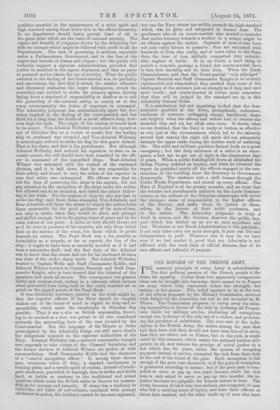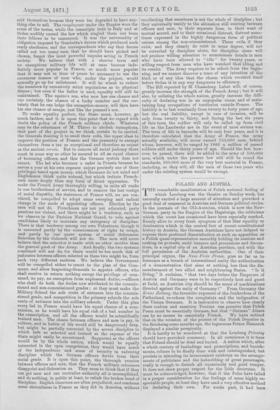THE REFORM OF THE FRENCH ARMY.
THE essential principle of every Army is subordination. The first political passion of the French people is the desire for equality. Unless those two apparently antagonistic ideas can be brought into harmony, there cannot be in France an army which fully represents either her strength, her society, or her genius. This belief appears to bo at the root of the reform proposed by the Military Commission, received with delight by the Assembly, but not as yet accepted by M. Thiers. The Commission proposes to sweep away the exist- ing inequalities in favour of the rich by declaring all French- men liable for military service, abolishing all exemptions except one, in favour of the only son of a widow, and prohibit- ing the purchase of substitutes. The very root of the indis- cipline in the French Army, the notion among the men that had they been rich they should not have been forced to serve, that they are slaves, not to France, but to the rich, is eradi- cated by this measure, which makes the national burden obli- gatory on all, and restores the prestige of moral justice to a law which has for years, under the system of accepting payment instead of service, exempted the rich from their duty at the cost of the blood of the poor. Such exemption is fair enough if the poor man chooses it, or if the price of exemption is graduated according to means ; but if the poor man is com- pelled to serve or pay up two years' income, while the rich man is only asked to serve or pay up two months', the in- justice becomes too palpable for human nature to bear. The Army becomes divided into two sections, one composed of men who feel a rankling sense of injury, and hate their officers as slaves hate masters, and the other made up of men who have sold themselves because they were too degraded to have any- thing else to sell. The remplagants under the Empire were the scum of the towns, while the conscripts both in Italy and at Sedan audibly cursed the law which singled them out from their fellows to be massacred. It was the universality of obligation imposed by Gambetta's decree which produced such ready obedience, and the correspondents who say that decree called out too many men, that he should have picked and chosen, forget the most powerful impulse acting in French society. We believe that with a shorter term and no exemptions military life will at once become inde- finitely more popular in France, so much more popular that it may not in time of peace be necessary to use the enormous masses of men who, under the project, would annually go up for enlistment. It will be wisest to reduce the numbers by excessively strict regulations as to physical fitness ; but even if the ballot is used, equality will still be maintained. The squire's son, who now has one chance and one certainty, the chance of a lucky number and the cer- tainty that he can lodge the exemption-money, will then have his one chance of escape, just like the peasant's son. To make equality perfect, the State must, however, go much farther, and it is upon this point that we regard with doubt the policy of the French military chiefs. Whatever may be the reluctance of M. Thiers to abolish exemptions, that part of the project is, we think, certain to be carried, the Generals desiring it to swell their rolls, the upper class to improve the position of France, and the peasantry to exempt themselves from a tax as exceptional and therefore as unjust as the ancient corve'e. But to remove all social jealousy there must in some way or other be secured to all an equal chance of becoming officers, and this the German system does not secure. The lad who becomes a cadet in Prussia because he serves a year at his own expense enjoys precisely one of those privileges based upon money, which Germans do not mind and Englishmen think quite natural, but which irritate French- men more deeply than any forni of direct oppression. To make the French Army thoroughly willing, to unite all ranks in one brotherhood of service, and to remove the last vestige of social disparity, the statesmen of France will, we are con- vinced, be compelled to adopt some sweeping and radical change in the mode of appointing officers. Election by the men will not do, Frenchmen are not yet educated, party passions are violent, and there might be a tendency, such as we observe in the Parisian National Guard, to vote against candidates likely to maintain any stringency of discipline. There is that tendency among our own Volunteers, though it is corrected partly by the consciousness of right to resign, and partly by our queer system of social deferenees. Selection by the Colonels will not do. The men will never believe that the selection is made with no other motive than the general good of the Army. And finally, the two systems combined will not do, for there would be too much risk of jealousies between officers selected as these two might be, from such very different motives. We believe the Government will be compelled either to resort to the plan of the Com- mune, and allow Inspecting-Generals to appoint officers, who shall receive in return nothing except the privilege of com- mand, no pay, no exemption from unpleasant duties,—officers who shall do both the duties now attributed to the commis- sioned and non-commissioned grades ; or they must make the Military School the sole route of entrance into the commis- sioned grade, and competition in the primary schools the sole route of entrance into the military schools. Under this plan every lad in France would have his equal chance of a com- mission, as he would have his equal risk of a bad number in the conscription, and all the officers would be scientifically trained men. The chasm between officers and men in pay, in culture, and in habits of life would still be dangerously deep, but might be partially corrected by the severe discipline to which lads so selected and trained at the expense of the State might easily be accustomed. Supported as the officers would be by the whole nation, which would be equally interested in the open competition, they would have much of the independence and sense of security in enforcing discipline which the German officers derive from their social grade. It is upon this point, the thorough reunion between officers and men, that the French military reformers disappoint and dishearten us. They seem to think that if they can get men and can centralize authority all is accomplished, and do nothing, in public at least, to relink the broken bond of discipline. English observers are of ten prejudiced, and condemn mere slovenliness in France as they did in America, without recollecting that smartness is not the whole of discipline ; but they universally testify to the alienation still existing between officers and men, to their separate lives, to their want of mutual accord, and to their occasional distrust, distrust some- times expressed in the highly dangerous form of political unions among the non-commissioned. These evils, if they exist, and they clearly do exist in some degree, will not be corrected by discipline alone, for discipline alone will not produce willing attention to monotonous details in men who have been allowed to " idle " for twenty years, or willing respect from men who have watched that idling and its results. The Army requires to be reknit from the begin- ning, and we cannot discover a trace of any intention of the kind, or of any idea that the chasm which revealed itself before Sedan is in any way dangerous to efficiency. The Bill reported by M. Ohasseloup Labat will, of course, greatly increase the strength of the French Army ; but it• will also, by enlisting the whole nation, greatly increase the diffi- culty of declaring war in an unpopular cause, and of main- taining long occupations of territories outside France. The liability is to last nominally from twenty to forty years of age, but the real liability, except in case of invasion, will be only from twenty to thirty, and during the last six years of this term the soldier will only be called up from civil life as the Landwehr are in the event of most serious war. The term of life in barracks will be only four years, and it is therefore calculated that the Army of France, the army actually available, will never exceed 750,000 men, behind whom, however, will be ranged by 1881 a million of passed soldiers still under thirty years of age. Should the law, how- ever, be passed, there will be added to the army of 500,000 men, which under the present law will still be round the standards, 360,000 more of the very best material in France, including, as they will, all the men of those two years who under the existing system would be exempt.































 Previous page
Previous page